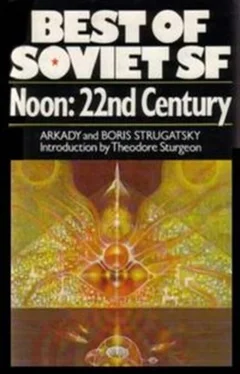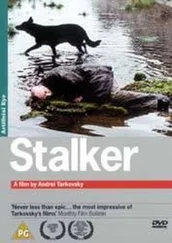“All this is very interesting,” I continued. “As a rule marine animals change their way of life sharply only during periods of reproduction. Then instinct forces them to go off to some quite unusual places. But reproduction has nothing to do with it here. Here there is some other instinct at work, perhaps one still more ancient and powerful. Right now the important thing for us is to follow the migratory path. So here I spend ten hours a day at this lake, under water. Today I’ve tagged one so far. If I’m lucky, by evening I’ll tag another one or two. At night they become unusually active and grab anything that gets close to them. There have even been instances of attacks on people. But only at night.”
Mashka had turned the volume of the radio all the way up, and was enjoying the powerful sounds.
“A little quieter, Mashka,” I requested.
She turned it down.
“So you tag them,” said Gorbovsky. “Fascinating. With what?”
“Ultrasonic generators.” I pulled a charge from the tag gun and displayed the ampule. “Little bullets like this. Inside is a generator with a range under water of thirty kilometers.”
He cautiously took the ampule and examined it attentively. His face became sad and old. “Clever,” he muttered. “Simple and clever.” He turned the ampule all around in his fingers as if feeling it, then lay it in front of me on the grass and got up. His movements had become slow and uncertain. He stepped over to his clothes and scattered them, found his trousers, and then froze, holding them in front of him.
I watched him, feeling a vague disquiet. Mashka held the tag gun at the ready, in order to explain how it was used, and she watched Gorbovsky too. The corners of her lips sank dolefully. I had noticed long ago that this often happened with her: the expression on her face became the same as that of the person she was observing.
Gorbovsky suddenly started speaking very softly, and with a certain mocking quality in his voice: “Honestly, it’s fascinating. What a precise analogy. They stayed in the depths for ages, and now they’ve risen up and entered an alien, hostile world. And what drives them? An ancient, dark instinct, you say? Or an information-processing capacity which had risen up to the level of unquenchable curiosity? After all, it would be better for it to stay home, in salt water, but something draws it… draws it to the shore.” He roused himself and started pulling on his trousers. These were old-fashioned, long. He hopped on one leg as he put them on. “Really, Stanislav, you have to think that these are very complex cephalopods, eh?”
“In their way, of course,” I agreed.
He was not listening. He turned toward the radio set and was staring at it. Mashka and I stared too. Powerful, discordant signals, like the interference from an X-ray installation, were coming from the set. Mashka put down the tag gun. “On six point oh eight meters,” she said distractedly. “Some sort of service station, or what?”
Gorbovsky listened closely to the signals, with his eyes closed and his head leaning to one side. “No, it’s not a service station,” he said. “It’s me.”
“What?”
“It’s me. Me—Leonid Andreevich Gorbovsky.”
“H-how can—?”
He gave a mirthless laugh. “How indeed? I would very much like to know how.” He pulled on his shirt. “How can it be that three pilots and their ship, on return from a flight to EN 101 and EN 2657, have become sources of radio waves of wavelength six point oh eight three meters?”
Mashka and I, naturally, remained silent. Gorbovsky fell silent too, while he fastened his sandals.
“Doctors examined us. Physicists examined us.” He got up and brushed sand and grass from his pants. “All of them came to the same conclusion: it’s impossible. You could die laughing, to see the surprise on their faces. But honestly, it was no laughing matter to us. Tolya Obozov refused leave and shipped out for Pandora. He said he preferred to do his broadcasting a little farther from Earth. Falkenstein went off to an underwater station to work. So here I am alone, wandering and broadcasting. And I’m always expecting something. Anticipating it and fearing it. Fearing, but anticipating. Do you understand me?”
“I don’t know,” I said, and glanced sidelong at Mashka.
“You’re right,” he said. He took the receiver and pressed it thoughtfully to his protruding ear. “And no one knows. It’s been a whole month already. It doesn’t weaken, and it never stops. Whee-waa… whee-waa… day and night. Whether we’re happy or sad. Whether we’re full or hungry, working or loafing. Whee-waa… But the emission from the Tariel is falling off. The Tariel is my ship. They laid her up, just in case. Her emissions are jamming the controls of some sort of equipment on Venus, so they keep sending inquiries from there, keep getting annoyed. Tomorrow I’m taking her a little farther out.” He straightened up and slapped his thighs with his long arms. “Well, time I left. Good-by. Good luck. Good-by, little Mashka. Don’t rack your brains over this. It’s a very complicated problem, honestly.”
He raised his open hand, bowed, and started off-tall, angular. We watched him go. He stopped near the tent and said, “You know, you should be a bit more delicate with these septipods. Otherwise you just tag and tag, and it, the one with the tag, has all the hassle.”
And he left. I lay on my stomach for a long while and then looked at Mashka. She was still watching him. It was clear that Leonid Andreevich Gorbovsky had made an impression on her. But not on me. His notions about how the bearers of intelligence in the universe could turn out to be immeasurably superior to us had not moved me at all. So let them be. If you asked me, the more superior they were, the less chance we would have of meeting up with them along the way. It was like fishing for roach, where a wide-mesh net was useless. And as for pride, humiliation, shock—well, we would probably live through it. I myself would somehow live through it. And if we were discovering and were exploring for ourselves a universe they had tamed long ago, well, what of it? It wasn’t tame from our point of view! Anyhow, for us they were just a part of nature that we had to discover and explore, even should they be three times superior to us—to us they were part of the environment! Although, of course, if, say, they had tagged me the way I would tag a septipod…
I glanced at my watch and sat up hurriedly. It was time to get back to work. I noted down the number of the last ampule. I checked the aquastat. I ducked into the tent, found my ultrasonic rangefinder, and put it in the pocket of my swim trunks.
“Give me a hand, Mashka,” I said, and started to strap on the aquastat.
Mashka was still sitting in front of the radio, listening to the unfading “whee-waa. ” She helped me put on the aquastat, and together we went into the water. Under water I turned on the rangefinder. Signals rang out. My tagged septipods were wandering all over the lake in their sleep. We looked knowingly at one another, and surfaced. Mashka spat, pushed her wet hair back from her forehead, and said, “There’s a difference between an interstellar ship and wet slime in a gill bag.”
I told her to return to shore and I dove again. No, in Gorbovsky’s place I wouldn’t be so worried. All this was too frivolous, like all that astroarchaeology of his. Traces of ideas! Psychological shock! There wouldn’t be any shock. Probably we wouldn’t even notice each other. They could hardly find us all that interesting.
17. The Planet with All the Conveniences
Ryu stood up to his waist in lush green grass and watched the helicopter land. Silver and dark-green shock waves from the rotors’ backwash swept over the grass. It seemed to him that the helicopter was taking its time about landing, and he shifted impatiently from foot to foot. It was very hot and close. The small, white sun was high, and moist heat rose up from the grass. The rotors started squealing more loudly, and the helicopter turned sideways to Ryu, then instantly dropped four or five feet and sank into the grass at the top of the hill. Ryu ran up the slope. The engine went quiet, the rotors turned more slowly, then stopped. Several people got out of the helicopter. The first was a lanky man in a jacket with rolled-up sleeves. He wore no helmet, and his sun-bleached hair stuck out on end over his long brown face. Ryu recognized him: it was Pathfinder Gennady Komov, the leader of the group. “Hello, landlord,” Komov said gaily, extending his hand. “ Konnichi-wa! ”
Читать дальше












